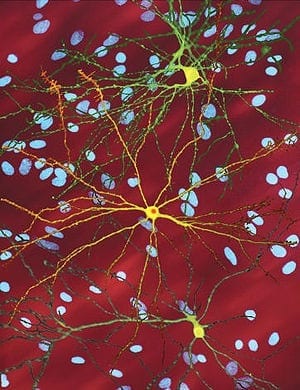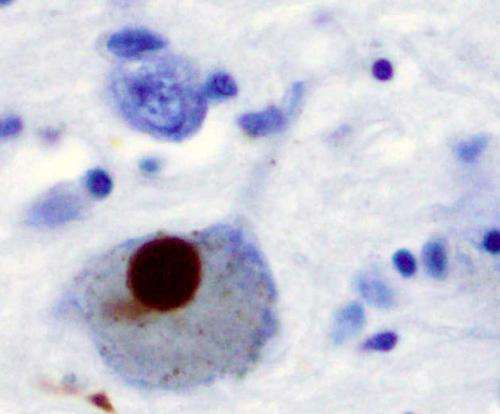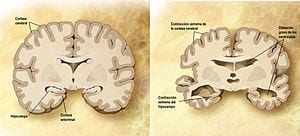
Researchers at Lund University have succeeded in preventing very early symptoms of Huntington’s disease, depression and anxiety, by deactivating the mutated huntingtin protein in the brains of mice.
“We are the first to show that it is possible to prevent the depression symptoms of Huntington’s disease by deactivating the diseased protein in nerve cell populations in the hypothalamus in the brain. This is hugely exciting and bears out our previous hypotheses”, explains Åsa Petersén, Associate Professor of Neuroscience at Lund University.
Huntington’s is a debilitating disease for which there is still neither cure nor sufficient treatment. The dance-like movements that characterise the disease have long been the focus for researchers, but the emotional problems affect the patient earlier than the motor symptoms. These are now believed to stem from a different part of the brain – the small emotional centre called the hypothalamus.
“Now that we have been able to show in animal experiments that depression and anxiety occur very early in Huntington’s disease, we want to identify more specifically which nerve cells in the hypothalamus are critical in the development of these symptoms. In the long run, this gives us better opportunities to develop more accurate treatments that can attack the mutated huntingtin where it does the most damage”, says Åsa Petersén.
The Latest Bing News on:
Huntington’s Disease
- A year on, Teva CEO Richard Francis celebrates progress in 'Pivot to Growth' planon May 8, 2024 at 12:02 pm
In about a year after launching a revamp strategy under CEO Richard Francis, Teva has managed to return its generics business to growth, secure approvals for a pair of high-profile biosimilars | While ...
- Join the 3rd Annual Golf for a Cure for Huntington’s Diseaseon May 8, 2024 at 10:21 am
The Massachusetts and Rhode Island Chapters of the Huntington’s Disease Society of America want you to help find a cure by joining this year’s golf for a cure ...
- Teva Pharm Q1 profit misses estimates, revenue riseson May 8, 2024 at 6:49 am
Teva Pharmaceutical Industries reported a smaller than expected rise in first-quarter profit citing higher impairments of tangible assets, while sales of copycat medicines and its branded drugs to ...
- Teva Pharm Q1 profit misses estimates, revenue riseaon May 8, 2024 at 4:56 am
Teva Pharmaceutical Industries reported a smaller than expected rise in first-quarter profit citing higher impairments of tangible assets, while sales of copycat medicines and its branded drugs to ...
- FDA Clears Ingrezza Sprinkle for Bipolar-Linked Tardive Dyskinesiaon May 7, 2024 at 5:00 pm
Ingrezza Sprinkle (valbenazine) offers an alternative for those who have trouble swallowing pills or prefer a different method of taking medication.
- Research suggests tear fluid testing as promising method for Huntington’s Disease monitoringon May 7, 2024 at 2:15 pm
Huntington's disease (HD) is an autosomal-dominant, fully-penetrant, neurodegenerative disease that most commonly affects adults during middle age.
- Huntington’s Disease Treatment Market Value: Understanding Pricing and Valuation Trendson May 6, 2024 at 11:24 pm
The global Huntington?s disease treatment market revenue was around US$ 316.5 million in 2021 and is estimated to reach US$ 708.2 million by 2031, growing at a compound annual growth rate (CAGR) of ...
- Team Hope brings awareness to Lake Comoon May 5, 2024 at 9:44 am
Hundreds of racers and community members gathered in the Bar Anticipation parking lot early Saturday morning as they awaited the start of the 7th ...
- Team Hope Walk raises awareness for Huntington’s Diseaseon May 5, 2024 at 1:54 am
Saturday for the Team Hope Statewide Walk. The walk was to raise money for Huntington’s Disease. Huntington’s disease is a rare, neurodegenerative disease that causes nerve cells in the brain to ...
- Leprosy drug may be effective in Huntington's disease, study suggestson May 3, 2024 at 6:16 am
A preclinical study from Karolinska Institutet offers hope for treating severe neurodegenerative diseases with an existing drug. The study suggests that the leprosy drug clofazimine may be effective ...
The Latest Google Headlines on:
Huntington’s Disease
[google_news title=”” keyword=”Huntington’s Disease” num_posts=”10″ blurb_length=”0″ show_thumb=”left”]
The Latest Bing News on:
Huntington’s Disease symptoms
- FDA Clears Ingrezza Sprinkle for Bipolar-Linked Tardive Dyskinesiaon May 7, 2024 at 5:00 pm
Ingrezza Sprinkle (valbenazine) offers an alternative for those who have trouble swallowing pills or prefer a different method of taking medication.
- Research suggests tear fluid testing as promising method for Huntington’s Disease monitoringon May 7, 2024 at 2:15 pm
Huntington's disease (HD) is an autosomal-dominant, fully-penetrant, neurodegenerative disease that most commonly affects adults during middle age.
- Huntington’s Disease Treatment Market Value: Understanding Pricing and Valuation Trendson May 6, 2024 at 11:24 pm
The global Huntington?s disease treatment market revenue was around US$ 316.5 million in 2021 and is estimated to reach US$ 708.2 million by 2031, growing at a compound annual growth rate (CAGR) of ...
- Team Hope Walk raises awareness for Huntington’s Diseaseon May 5, 2024 at 1:54 am
Saturday for the Team Hope Statewide Walk. The walk was to raise money for Huntington’s Disease. Huntington’s disease is a rare, neurodegenerative disease that causes nerve cells in the brain to ...
- Scientists Finally Explain Puzzling Link Between Depression and Cardiovascular Diseaseon May 4, 2024 at 8:58 pm
Gene expression analysis of blood identifies a functional group of genes linked to both depression and cardiovascular disease. Depression and cardiovascular disease (CVD) pose significant challenges ...
- A sprinkling of good news for the treatment of HD choreaon May 3, 2024 at 1:18 pm
A new form of the chorea drug valbenazine (INGREZZA) has been approved by the United States Food and Drug Administration (FDA) for those who have difficulty swallowing pills.
- I plan to dump the love of my life because of my diagnosison May 3, 2024 at 8:40 am
I’ve just been diagnosed with a fatal, hereditary illness that will probably kill me before I’m 50, and I’m terrified. My mum died of it, and my siblings and I have all just been ...
- Leprosy drug may be effective in Huntington's disease, study suggestson May 3, 2024 at 6:16 am
A preclinical study from Karolinska Institutet offers hope for treating severe neurodegenerative diseases with an existing drug. The study suggests that the leprosy drug clofazimine may be effective ...
- Neurodegeneration – News and Featureson April 30, 2024 at 10:11 pm
Abnormally high levels of an immune-system molecule, interleukin-6 (IL-6), prior to Huntington’s disease symptoms suggested it led to disease progression. However, Huntington’s model mice bred to lack ...
- Neurocrine Biosciences Announces U.S. FDA Approval of INGREZZA® SPRINKLE (valbenazine) Capsuleson April 30, 2024 at 2:12 pm
Neurocrine Biosciences, Inc. (Nasdaq: NBIX) today announced the U.S. Food and Drug Administration has approved INGREZZA® SPRINKLE (valbenazine) capsules, a new oral granules formulation of INGREZZA® ...
The Latest Google Headlines on:
Huntington’s Disease symptoms
[google_news title=”” keyword=”Huntington’s Disease symptoms” num_posts=”10″ blurb_length=”0″ show_thumb=”left”]











